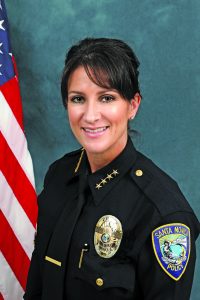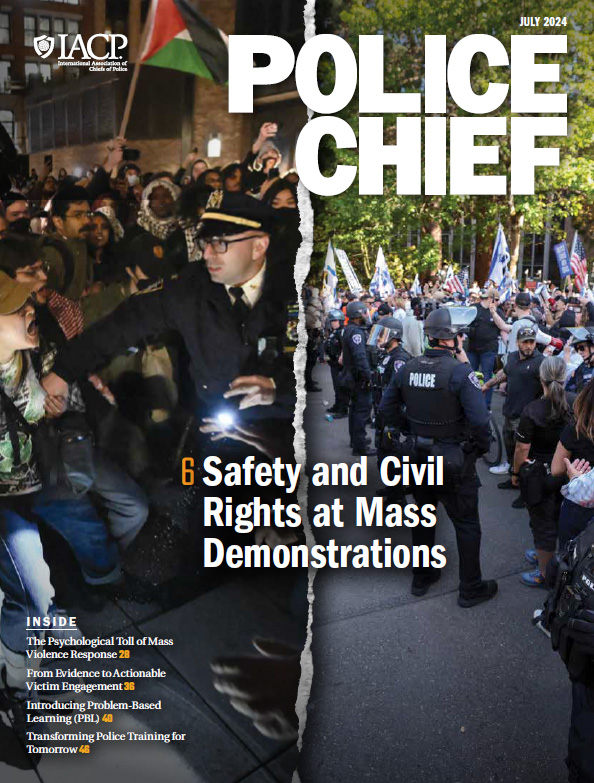
I remember standing on the U.S. East Coast on 9/11, watching the news of that horrific day unfold, and thinking to myself that the world had never seen anything like it—that it was too much; too difficult; but unquestionably, too important an enemy and issue that had to be fought against and overcome.
Then I thought of my father, who fought bravely in the Canadian Army during World War II, and I wondered what he felt the day he heard about Pearl Harbor, the attack that brought the war to North America. Even though it must have seemed too much and too difficult, they fought, and they overcame.
Our world today can feel overwhelming, too. But, just as extreme challenges have been overcome in the past, they will be again now. While the COVID-19 global pandemic brings its own inherent set of health and economic crises, it has also instigated several tangential, but undeniably related issues—and many of those issues fall to the law enforcement community worldwide to either respond to or to proactively interdict and prevent. In these challenging times, it is the strength of the IACP, found in its collective membership—bringing worldwide experiences and perspectives—that will shape a path forward.
While there are a multitude of issues and topics facing our profession today, each incoming IACP president customarily chooses a few upon which to focus the energy and resources of our membership, which they introduce through their first speech as president and their first message in Police Chief. As many have before me, I spent the years and months leading into October 2020 crafting the initiatives I intended to focus on, only to have time and circumstances change that course in some way.
Punctuating the “I” in IACP
I have had the great fortune to meet and talk with many in the international law enforcement community and have found that while time and geography may separate us, mission and events bring us together. Across the globe, the men and women in our organizations face dangerous, tactically complex, critical incidents. They employ analytical tools and try new intelligence techniques in order to prevent criminal activity. They work to partner with others in addressing the noncriminal and socially vexing topic of homelessness. They strive to better understand how to interact with those experiencing a mental health crisis. They stop and play an impromptu game of basketball every now and then with youth in the areas where they work. They take money out of their own pockets to pay for a meal for someone in need. And they report to work for every shift to serve their communities.
Across the globe, we also all face similar challenges. While crime patterns and criminal variety may vary from city to city and nation to nation, traffic collisions both impact and take the lives of our community members. Leaders worldwide strive to deepen relationships with their communities, promote diversity in their organizations, search for the best training on pertinent topics, and look to each other for new ideas and models of best practice. Over the next 12 months, IACP will focus on bringing together a working group comprising international representatives to identify some of the top issues we all share and work toward identifying the various, global approaches to successfully working in each area of concern.
Addressing the Root Causes of Homelessness
Last December, during a tour of the Store Street Garda Station/North East Inner City project in Dublin, Ireland, a superintendent of the An Garda Síochána spoke about homelessness not only in his country, but also based on his own travel and experiences in other major cities throughout Europe. It is undeniable—homelessness is a global problem to which no one seems to have found a complete solution. To be fair, a majority of our organizations have found certain solutions. Many of us have created special teams within our departments that work cross-discipline with mental health providers, social services, and nonprofits to offer assistance to those experiencing homelessness. But, while there have been many successes from this type of work, we are also no closer to ending homelessness in any of our communities or countries. This begs the question: Are our solutions effective? And if they aren’t, then the next, logical question is: Have we identified the problem correctly?
Homelessness, in and of itself, is not a crime. And while law enforcement will always be a partner in solving this difficult problem, perhaps two more productive areas to focus on in this arena are the twin issues of untreated mental illness and drug and alcohol addiction. Taken separately or together, there are few officers who would report not dealing with these in some form with most of the people experiencing homelessness whom they attempt to help. While our current efforts through specialized teams should not be lessened, we need to generate a dialogue around the root causes of homelessness, not just the proximate ones we currently have the ability and tools to impact. And, in that dialogue, we need to bring partners to the table who currently have not been involved. Those partners need to be people and groups rooted in both mental health and drug and alcohol addiction work, as well as businesses, community members, and elected officials who can move forward a holistic dialogue on the topic of homelessness, while furthering the voice that law enforcement has had on this topic for many years now.
Critical Incidents
Many of us now have the experience of leading organizations in communities facing new forms of civil unrest. The topic is extremely complex. Globally, legal protections for protesting and expressing free speech operate under varying constitutions, laws, and legalities. But for the IACP membership in totality, the responsibility for our organizations to interdict and ensure safety is universal. During the next 12 months, the IACP will work to bring together a cross-section of international law enforcement leaders whose organizations have recently experienced critical incidents to share lessons learned and develop best practices, with an eye toward future trends that we can then share broadly with our membership. Through this discussion, there will be an emphasis on crowd management, facility and business protection, intelligence gathering and sharing, and overall community safety. Through our collective experiences, we can and will improve our abilities and capabilities.
While time and geography may separate us, mission and events bring us together.
Last, I’ll take a moment to address the elephant in the room. We are in particularly difficult times in policing at this moment. And, while we come together as the global IACP organization, each one of us leads locally. Just as every issue begins as a local issue that can take over the national or world stage, any solution will also begin as a local solution that can equally take over the national or world stage. I encourage each of you to continue to lead locally through these challenging times and for all of us to come together in voicing that collective best of our great profession.
Thank you for what you do each and every day. I look forward to working with all of you, serving this organization, and moving into a future of safety and renewed personal connections.


